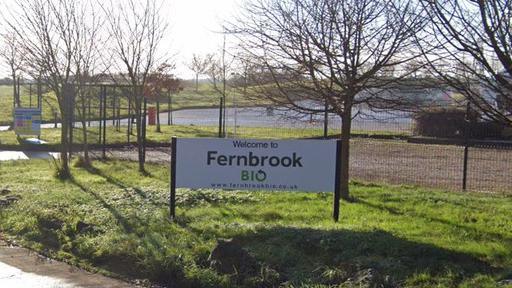Waste plant to expand despite 'disgusting smell'

The plant says it will be able to more than double the waste it treats every year
At a glance
Plans for the expansion of a Northamptonshire anaerobic plant have been approved
Fernbrook Bio, in Rothwell, plans to double the amount of waste it can treat annually
Local residents have expressed concerns for years about the "absolutely disgusting" smell from the plant
The Fernbrook Bio director says the smell issue will be addressed during the improvement works
- Published
A controversial anaerobic digestion plant in Northamptonshire is set to expand.
Fernbrook Bio, a plant off the A14 in Rothwell, treats 49,000 tonnes of waste, which will more than double to 100,000 tonnes annually after a council vote.
However, local residents have expressed concerns about the "awful stench" created by the plant.
The plant director, Jamie Williams, said Fernbook Bio will also undergo £500,000 of improvements, including work to help trap the smell.
Mr Williams said the plant's expansion will see 4,000 homes using biogas created there and 55,000 tonnes of digestate will be used on farms nearby, replacing the need for chemical fertiliser.
North Northamptonshire Council’s (NNC) strategic planning committee approved the new measures and improvements at a meeting on 15 May, according to the Local Democracy Reporting Service (LDRS).
The committee was assured work to increase monitoring of the smell will take place.
Rothwell Town Council had objected to the expansion and said one resident had written to it last year to complain about the "absolutely disgusting stench [that] ruined much of our spring and summer."
Rothwell and Mawsley’s NNC councillor, Cedwien Brown, said the plant’s owners had "promised time and time again" that once adjustments were complete, the problem of the smell would be resolved.
"This has never happened and 13 years on I can assure you that the area most certainly does smell and it’s absolutely disgusting," councillor Brown told the committee.
Anaerobic digestion plants process organic matter, such as food waste, farm waste or sewage, through anaerobic digestion, breaking it down into gas and solid residue.
The process generates a mixture of methane and carbon dioxide, also known as biogas, as well as water and a biofertiliser known as digestate.
While biogas can be used to generate heat and electricity, digestate is most commonly used as fertiliser, since it is rich in nutrients.
Find BBC News: East of England on Facebook, external, Instagram, external and Twitter, external. If you have a story for us, email eastofenglandnews@bbc.co.uk, external